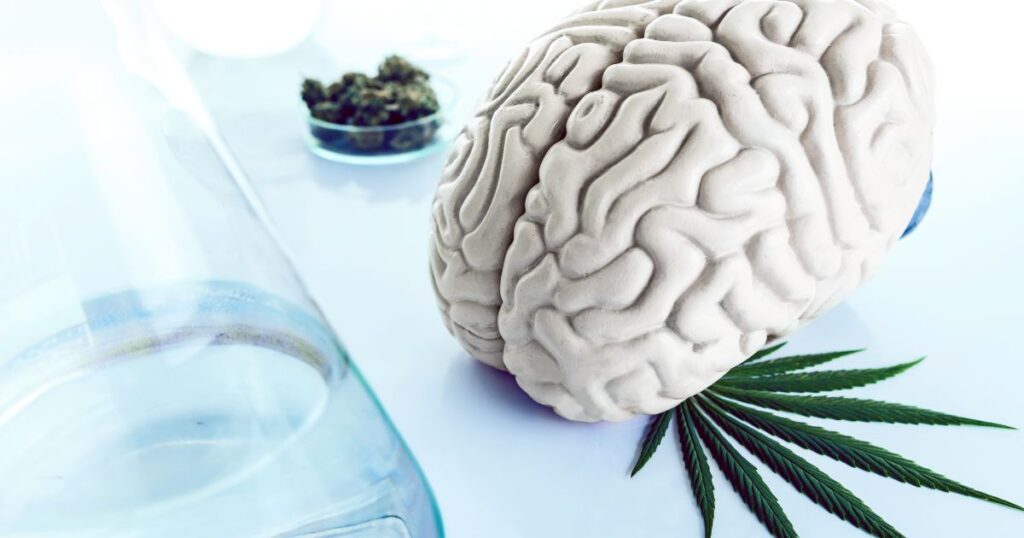Recent research using UK Biobank data suggests that cannabis use may positively impact cognitive function by potentially reversing certain aspects of cognitive aging, challenging long-standing assumptions about cannabis and brain health.
The study, which analyzed data from over 25,000 participants, reveals fascinating insights into how cannabis affects the aging brain and cognitive performance.
We must note that this research is currently a preprint and has not yet been peer reviewed by a journal. While the findings are promising, they should be interpreted with appropriate caution until formal peer review is complete.
What the Study Discovered
Researchers examined the relationship between cannabis use, brain aging, and cognitive function using advanced neuroimaging techniques. They focused specifically on functional network connectivity (FNC), which measures how different brain regions communicate with each other. The results were striking and unexpected.
Cannabis users showed brain network patterns that were significantly different from non-users. Most remarkably, these patterns appeared to mirror characteristics typically found in younger brains rather than older ones. The study found that cannabis use was associated with what researchers describe as “reversing cognitive aging” through changes in whole-brain functional network connectivity.
The research team discovered overlapping brain network configurations between cannabis use and healthy aging, particularly in connections between subcortical and sensorimotor regions, as well as between subcortical and cerebellar areas. However, the effects were surprising—aging usually causes decline, but cannabis users showed preserved or even enhanced abilities.
Cognitive Performance Benefits
Beyond the neuroimaging findings, the study on cannabis revealed something equally compelling about cognitive performance. Cannabis users consistently outperformed non-users across multiple cognitive domains tested in the research. This superior cognitive performance appeared to correspond directly with the brain network changes observed in the neuroimaging data.
The cognitive benefits weren’t limited to a single area of mental function. Instead, the effects of cannabis appeared across a broad range of brain systems, suggesting a comprehensive influence rather than targeted improvements in specific cognitive domains.
Understanding the Brain Science
The researchers propose that these effects might be explained through neural dedifferentiation and compensation theories. Neural dedifferentiation refers to the brain’s ability to recruit additional neural resources when faced with challenges, while compensation theory suggests that the brain can develop alternative pathways to maintain function.
The endocannabinoid system, which cannabis compounds interact with, plays crucial roles in brain function including neuroprotection, inflammation reduction, and neural plasticity. These mechanisms could potentially explain how cannabis use might influence brain aging processes.
The study’s focus on functional network connectivity provides insight into how different brain regions communicate with each other. As we age, these connections typically become less efficient. However, cannabis users in the study showed connectivity patterns more similar to younger individuals, suggesting a potential protective or restorative effect.
Implications for Healthy Aging
These findings arrive at a time when cannabis use among older adults is increasing dramatically. As societal attitudes shift toward acceptance and many jurisdictions legalize cannabis for medical and recreational use, understanding its effects on the aging brain becomes more and more important.
The research shows that cannabis may provide unique benefits for cognitive aging that researchers hadn’t recognized before. If these findings hold up to peer review and replication, they could reshape how we think about cannabis in the context of healthy aging and cognitive preservation.
The study’s use of the UK Biobank data—one of the largest biomedical databases in the world—lends significant weight to the findings. With over 25,000 participants, this represents one of the most complete examinations of cannabis use and brain aging to date.
The Broader Context
Cannabis contains numerous compounds called cannabinoids, with THC and CBD being the most well-known. These compounds interact with the body’s endocannabinoid system, which helps regulate various physiological processes including mood, memory, appetite, and pain sensation.
Previous research has suggested that cannabinoids might have neuroprotective properties, potentially protecting brain cells from damage and supporting healthy brain function. This new study provides some of the first large-scale evidence that these theoretical benefits might translate into measurable effects on brain aging and cognitive performance.
The findings also align with emerging research on cannabis as a potential therapeutic tool for various age-related conditions. Some studies suggest that treatments may benefit conditions like Alzheimer’s, Parkinson’s, and other neurodegenerative disorders, but researchers need more evidence to confirm their effectiveness.
A Promising Foundation for Future Research
While these results are encouraging for cannabis advocates and researchers alike, they represent just the beginning of understanding how cannabis affects the aging brain. The preprint status means the research hasn’t yet undergone rigorous peer review, which is an essential step in the scientific process.
Future studies will need to replicate these findings and explore the mechanisms behind the observed effects. Researchers will also need to investigate optimal dosing, delivery methods, and potential risks alongside the benefits. Long-term longitudinal studies following the same individuals over time would provide even stronger evidence for cannabis’s effects on brain aging.
The study opens new avenues for research into cannabis-based interventions for cognitive aging. As our understanding of the endocannabinoid system continues to expand, we may discover even more ways that cannabis compounds can support brain health throughout the lifespan.
Moving Forward with Cannabis and Aging Research
This research represents a significant step forward in understanding the complex relationship between cannabis and cognitive function. The finding that cannabis users show brain patterns resembling younger individuals, combined with higher cognitive performance, challenges many preconceptions about cannabis effects on the mind.
The research highlights the importance of continued scientific investigation into cannabis and its effects on human health. As legal barriers to cannabis research continue to fall, we can expect more studies that will help us better understand both the benefits and risks of cannabis use across different populations and age groups.















